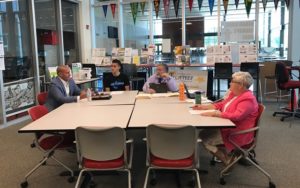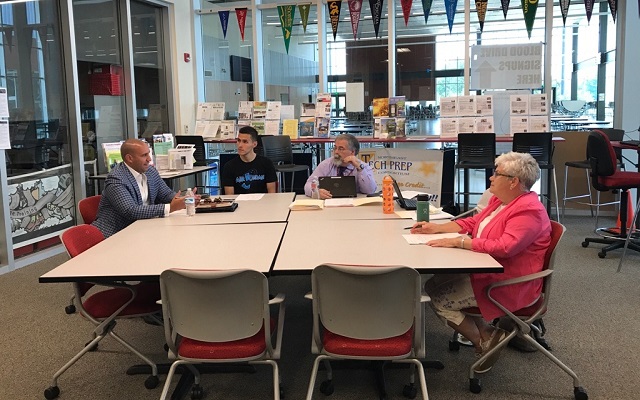The focus of the 2016 Bill Henningsgaard Fund for Children was funding a program that supports Eastside Pathways’ initiative to increase attendance and/or being in school on time for students of all ages. The recipient – Community Truancy Board (Bellevue School District) – was selected because it is working to ameliorate the causes of truancy and focuses on a very specific, targeted population of youth. The Community Truancy Board (CTB) is an intervention program that offers support and counseling to as many as 60 families every year.
The recipient – Community Truancy Board (Bellevue School District) – was selected because it is working to ameliorate the causes of truancy and focuses on a very specific, targeted population of youth. The Community Truancy Board (CTB) is an intervention program that offers support and counseling to as many as 60 families every year.
The $5000 grant provided flexible resources for transportation (cab rides, ORCA cards) expenses to the parents and students to attend school or CTB meetings, fees for community or sports activities, alarm clocks and also supported summer school fees.
The Bellevue School District (BSD) is cognizant of the correlation between a student’s overall academic success and regular school attendance. It is addressing the issue, guided by State law, through a set of interventions established to support students and families.
Washington State law requires that schools file a truancy petition with the King County Juvenile Court when a student has accumulated seven unexcused absences in a month or ten in a school year. After a single unexcused absence, the school is required to contact parents, which is generally done by phone or letter. After a second unexcused absence, the school is required to schedule a conference with the parent and student to discuss solutions to the truancy. If a student accumulates five unexcused absences in a month, the school may file a petition with the King County Juvenile Court.
In 2009, BSD with the assistance of King County staff and the Center for Children and Youth Justice implemented a three-tier program of interventions:
- School Engagement Workshop: truant students are referred to attend informational sessions that allow parents and students the opportunity to come up with an attendance plan to ensure no further absences.
- Community Truancy Board(CTB): community volunteers serve on panels that interview students and their parents in an effort to identify reasons for the student’s failure to attend school. The board makes recommendations to the students, their parents and the school district intended to improve the student’s attendance record and support the youth in making such a change.
- District Level Case Manager: students and families are assigned to a BSD staff person who connects the family with services and interventions that the district offers.
The CTB seeks to address the problem of truancy through the collaboration of school, court, and community resource providers. A CTB member is a volunteer who is interested in and concerned about youth and believes that a community can and should respond to youth’s problems.
 Truancy board meetings are held every Wednesday from October through June at a designated location. The CTB sees approximately 48-60 truant students in that time span. For the 2016-17 school year, the CTB has been meeting from 3:00-5:30 p.m. at Sammamish High School. There is a fixed panel of four to six volunteers assigned to a week of the month to meet with a new family and to follow up and review the progress of previously seen students. The panel meets with new students and their family for an hour of focused time. Through the process of mindful inquiry – listening to their stories and learning what obstacles have made school attendance a challenge – the needs of the student and family are identified. As a group, they seek to present a helpful and collaborative attitude.
Truancy board meetings are held every Wednesday from October through June at a designated location. The CTB sees approximately 48-60 truant students in that time span. For the 2016-17 school year, the CTB has been meeting from 3:00-5:30 p.m. at Sammamish High School. There is a fixed panel of four to six volunteers assigned to a week of the month to meet with a new family and to follow up and review the progress of previously seen students. The panel meets with new students and their family for an hour of focused time. Through the process of mindful inquiry – listening to their stories and learning what obstacles have made school attendance a challenge – the needs of the student and family are identified. As a group, they seek to present a helpful and collaborative attitude.
The CTB works with students from the entire district in grades K-12 with attendance issues. The issues vary from family to family but oftentimes include lack of transportation, home dysfunctionality, poverty, mental health and/or drug abuse. The families seen range from recent immigrants to young adults who did not complete school themselves, to affluent parents who are dealing with children with medical issues.
The majority of the truancy cases seen are of middle and high school students. However, in recent years, the Board has begun to focus on elementary school students with excessive tardies and/or absences as an early intervention and to prevent a pattern from developing as they transition into middle or high school. This level of intervention mostly involves the parents more so than the student.
Board members discuss recommendations for improving school attendance such as:
- Assisting the parent or the student in obtaining additional services that could eliminate or ameliorate the causes for absences
- Suggesting the student enroll in a different school, an alternative education center or program
The CTB is comprised of approximately 20 community member volunteers from diverse backgrounds who have also secured outside donations as a community effort. They represent the following local organizations or businesses:
- Bellevue Police Department
- Bellevue School District (Human Services)
- Bellevue YMCA
- City of Bellevue
- Bellevue LifeSpring
- SeaMar
- Concur
- Eastside Latino Leadership Forum
- Eastside Pathways
- John L. Scott Real Estate
- Jubilee REACH
Article written by Nahyeli Mendivil, Truancy Case Manager and Support Coordinator at the Bellevue School District.
The CTB is currently seeking interested community members who would like to be a part of the 2017-18 cohort. There will be a meet and greet later in June and a new volunteer orientation in August so they can be ready in October. If you are interested in participating as a volunteer or have any questions, please contact Nahyeli Mendivil at mendiviln@bsd405.org or 425-456-4215.

